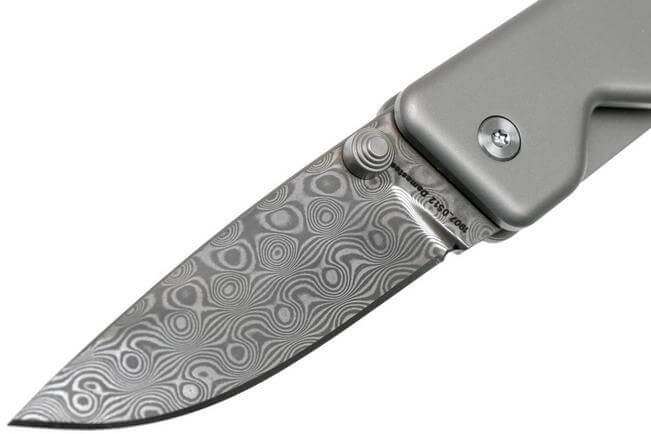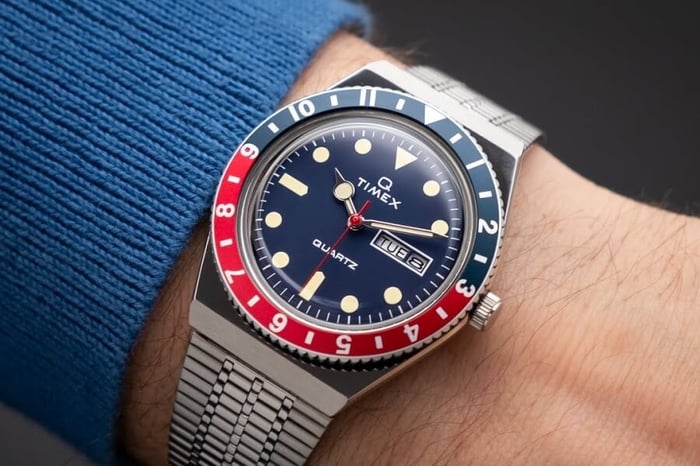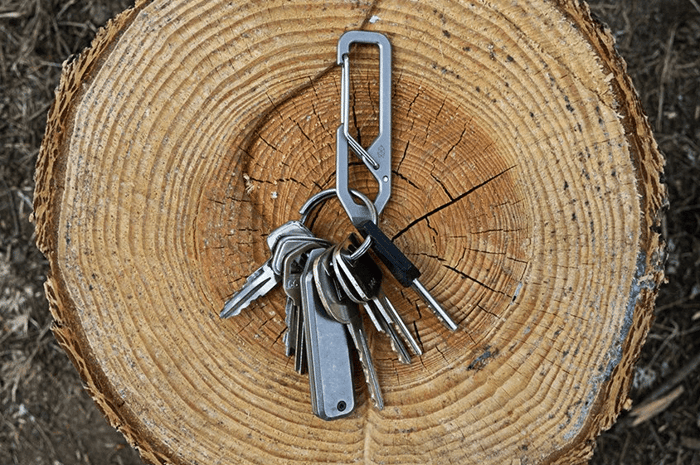 In Call of Duty: Modern Warfare (2019) and Call of Duty: Mobile , iridescent blue and red Damascus steel weapon camouflage is available for players who have unlocked all other camouflages for every base weapon in the game.
In Call of Duty: Modern Warfare (2019) and Call of Duty: Mobile , iridescent blue and red Damascus steel weapon camouflage is available for players who have unlocked all other camouflages for every base weapon in the game.
DAMASCUS STEEL: A BRIEF HISTORY
You know the trademark flowing water-esque “Damascus” design when you see it. It is instantly recognizable by its variety of distinctive wavy, geometrical patterns, its gorgeous aesthetic, and its remarkably sleek finish.
“Damascus Steel”, if you can believe it, is not, however, actually a type of original steel (hence what makes it so mythical). Rather, “Damascus Steel” is the euphemism for a very specific method of steel forging that first emerged in 3rd and 4th century Damascus, the capital of modern Syria (not to mention the oldest capital in the world).
During this period, Damascans capable of superior craftsmanship and skill cast Damascus blade steel from wootz (an ultra-high carbon crucible steel from India) ingots in order to craft, purchase, and trade lightweight yet hard, strong, tough, sharp, and beautiful knives (and other weapons) that were simultaneously flexible and resistant to shattering, a stark contrast to other defenses of the period that had been merely forged from iron and were thus highly vulnerable to corrosion.
Producing the original Damascus steel was no joke, requiring Damascans to maintain a constant temperature in order to create the signature Damascus pattern. To do the job right, Smiths melted iron and steel together with charcoal under conditions that allowed for little to no oxygen. Via this process, the metal absorbed carbon from the charcoal, and the slow cooling of the alloy in turn created a crystalline material that contained carbide.
The final product was a blade with sharpened edges so legendary and resilient on the battlefield that they were rumored to be able to cut through silk fluttering in mid-air.

In addition to the fact that wootz steel no longer exists, it is believed that the exact techniques that the forgers of yesterday used to make Damascus Steel were lost sometime in the 1700’s. Though many have and continue to go to great lengths in order to reverse engineer the process in order to try and precisely replicate the original famed Damascus steel material, no one has been entirely successful in the endeavor. With the differences in raw materials and manufacturing methodology, how could one? One couldn’t.
Nevertheless, many modern blades today are made using high-carbon steel and forged with pattern-welding approximate Damascus steel, consistent with original process.
MODERN-DAY DAMASCUS STEEL
Since 1973, the year that Bladesmith William F. Moran unveiled his "Damascus knives" at the Knifemakers' Guild Show, everyday carry enthusiasts have recognized and understood that contemporary “Damascus steel” products are not literally made from the wootz steel used in the original Damascus steel. Rather, “Damascus steel” products are simply those steel blades that bear the famous watery pattern through their metal while possessing many of the same characteristics exhibited by the original weapons.
Contemporary blacksmiths make Damascus steel from several types of steel and iron slices that they wield together (most makers choose up to a whopping five different types of alloys) in order to form a billet (a semi-finished product) in a rigorous, hands-on process that produces completely unique final results depending on the types of steels the Smith uses and how the Smith works the billet (which is drawn out and folded until the desired number of layers are formed).
Almost all layered and forged Damascus steel that you see today is pattern-welded (made by layering iron and steel and forging the metals together by hammering them at high temperature in order to form a welded bond, producing that classic watery effect) or san-mai (the folding step is left out in order to give blades a hard, protected edge that’s fused – not mixed – with stainless steel; consists of two outer stainless steels and a harder stainless or carbon steel core).
At the end of the day, it’s the composition of the steel and the way that the layers are forged together that ultimately determines the outcome of the final product.
NOT YOUR AVERAGE BLADE
 Jon Snow (Kit Harington) prepares to slice and dice a White Walker with his Dragonglass sword made of Valyrian steel (inspired by Damascus steel) in Game of Thrones.
Jon Snow (Kit Harington) prepares to slice and dice a White Walker with his Dragonglass sword made of Valyrian steel (inspired by Damascus steel) in Game of Thrones.
When HBO’s Game of Thrones premiered in 2011, the series mainstreamed Damascus Steel on a whole new level, as the actual Damascus steel of lore inspired the show’s Valyrian steel (which George R.R. Martin’s first introduced in his 1996 novel, A Game of Thrones), that rare material capable of killing White Walkers. The fictional history of Valyrian steel mirrors the actual history of Damascus steel, as the authentic art and practice of forging both steels was lost over time, cementing their iconic status as relics of ancient civilizations.
In any case, EDC aficionados rightfully regard Damascus steel pocket knives as some of the most durable and breathtaking on the market, true embodiments of longevity.
Here are some qualities that make the Damascus blades the perfect addition for any Gallantry Man or any EDC lover, period…
- ONE-OF-A-KIND BLADES. The boatloads of effort and time that goes into the forging process can be seen in each blade’s unique, individual pattern. Simply put, no Damascus blade is the exact same as another.
- SHARP. VERY SHARP. With an edge known for its wicked sharpness, the by-product of the micro-serration created by the use of multiple steel alloys during the foraging process, the Damascus blade can really cut something.
- TIME-SAVER. Despite its reputation, a Damascus blade requires a lot less sharpening that most comparable blades. That means no more having to worry about constant maintenance after every task involving slicing or sawing, you know what we mean?
- STRENGTH. Casting up to five alloys creates carbon nanotubes in the blades, instilling them with incredible strength, more than enough than what is required for most everyday tasks.
- TIMELESS. Damascus blades are sharp, durable, and built to last, that’s for sure. These are the qualities that made them legendary on the battlefield in the first place. That being said, the craft and quality that goes into these blades is what makes them distinct. Each blade is not just a tool, it’s a work of art with a compelling and fascinating history.
- THE RIPPLE. To the layman, distinguishing one stainless steel apart from another is often an exercise in futility. With its famous swelling ripple in its blade, Damascus makes itself known from the jump with a flourish that instantaneously differentiates it.
The Road to Damascus begins with the following Damascus and Damasteel blades available from Gallantry right here, right now…
THE CHAPTER KNIFE FROM THE JAMES BRAND

Apparently, The James Brand has had a problem finding the ultimate knife to add to their everyday carry arsenal. So the Portland-based crew decided to make one and they named it The Chapter. With a blade made from Damascus steel and a simple 6AL-4V titanium frame lock construction, this knife is lightweight, portable, easy to care for, and looks good on top of being a durable and functional folder. If you want a useful knife that will last a lifetime, this is it.
- Damascus steel drop point straight blade
- 6AL-4V titanium frame lock construction
- 416 black oxide coated stainless steel hardware
- 2.81" blade length
- Semi-stainless
- Corrosion resistant
- Reimagined take on single blade folder
Available in Titanium/Damascus
The Chapter Knife
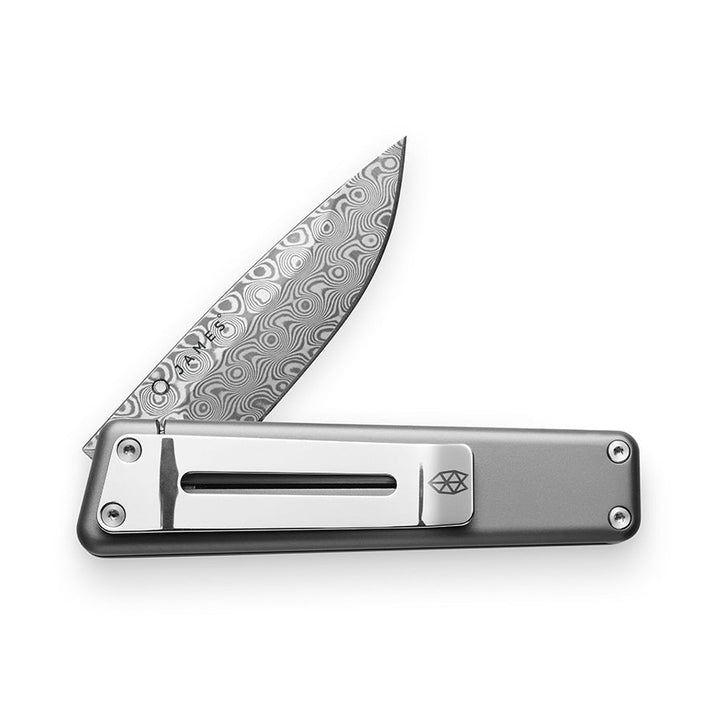
$399.00
[tab-section data-sc-active-background="#ffffff" data-sc-other-background="#ffffff" data-sc-color="#555555"][tab title="Details"] Apparently, James Brand has had a problem finding the ultimate knife to add to their everyday carry arsenal. So the Portland-based crew decided to make one and they named it The Chapter. With a blade made from… read more
THE DUVAL KNIFE FROM THE JAMES BRAND

Built for adventurous gentlemen, The Duval is a sleek minimalist cutting tool with a classic mid-century design. It has a sturdy 2.65-inch Damascus steel blade, stainless steel hardware, and titanium handle. The front-flipping knife deploys smoothly and is secured in place via a frame lock, so you can cut and slice with confidence. And The Duval is The James Brand’s first sheepsfoot blade. Worthy of being a family heirloom, this handsome knife is one to be treasured for years to come.
- Damasteel Rose DS93X™ sheepsfoot blade
- Titanium handle
- Stainless steel hardware
- Ceramic ball bearings
- Frame lock
- 2.65" blade
- 3.875" handle
- 6.375" overall
Available in Titanium/Damascus
The Duval Knife
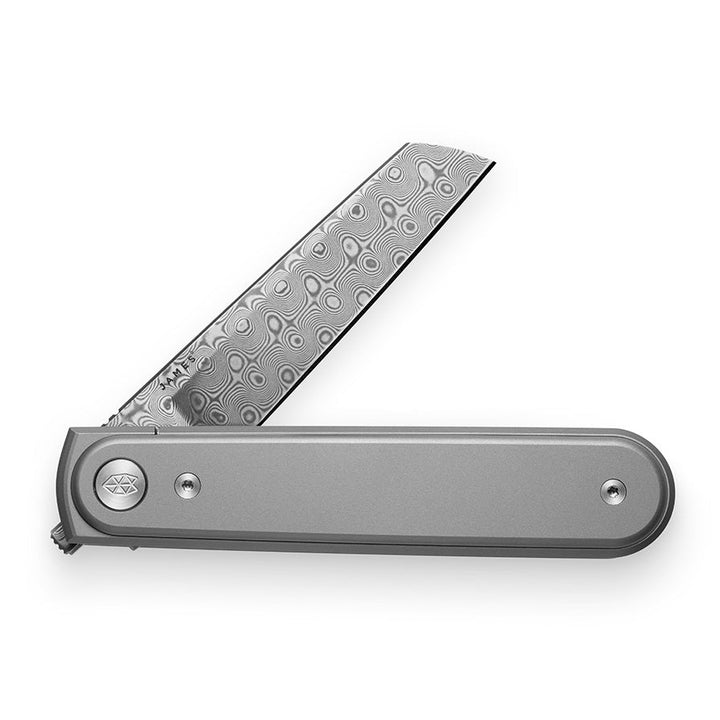
$375.00
[tab-section data-sc-active-background="#ffffff" data-sc-other-background="#ffffff" data-sc-color="#555555"][tab title="Details"] Built for adventurous gentlemen, The Duval is a sleek minimalist cutting tool with a classic mid-century design. It has a sturdy 2.65-inch Damascus steel blade, stainless steel hardware, and titanium handle. The front-flipping knife deploys… read more
If you’re on a tight budget at the moment, but you’re still in the market for a killer starter Damascus-style product that won’t cost you that Damascus-style cash, consider the Ti-Tape Titanium Tape Measure from TEC accessories, with a slick, laser-engraved Damascus-style pattern available exclusively from Gallantry.
TI-TAPE TITANIUM TAPE MEASURE W/ DAMASCUS FINISH FROM TEC ACCESSORIES

The Ti-Tape is simply the smallest titanium tape measure in the world. Slightly larger than a US Quarter, it is the perfect tape measure for everyday carry. Why? Because it is super TINY, ultra-durable, and extremely lightweight. It also includes a removable keychain clip, so you can attach it anywhere to keep it with you at all times. As if that wasn't enough, the user-replaceable 3' measuring tape ensures you will never have to buy another portable tape measure again. Ever. This exclusive edition for Gallantry only has a laser-engraved Damascus-style finish.
- Manufactured from grade 5 titanium to last a lifetime
- Laser engraved Damascus-style finish
- Corrosion resistant and hypoallergenic
- 3 foot measuring length
- High contrast black on white markings, both imperial and metric units
- Removable stainless steel keychain attachment clip
- Replaceable measuring tape
- Ultra compact size
- Made in USA
Available in Titanium with Laser-Engraved Damascus-Style Finish
Ti-Tape Titanium Tape Measure - Damascus Finish
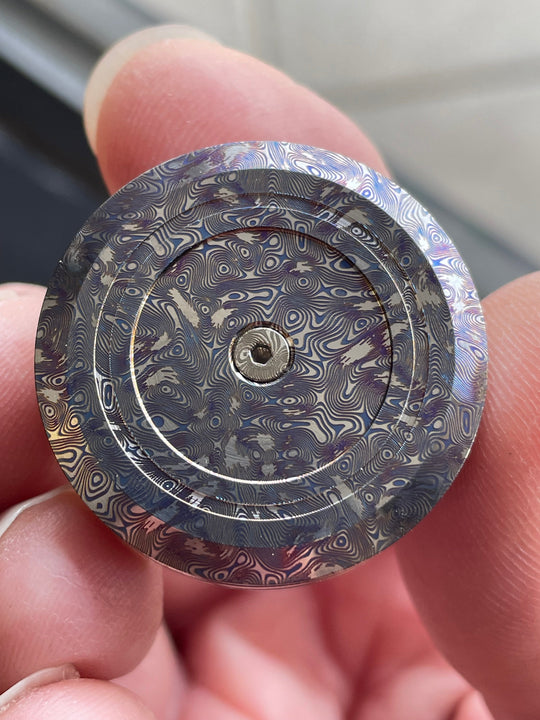
$72.95
[tab-section data-sc-active-background="#ffffff" data-sc-other-background="#ffffff" data-sc-color="#555555"][tab title="Details"] The Ti-Tape is simply the smallest titanium tape measure in the world. Slightly larger than a US Quarter, it is the perfect tape measure for everyday carry. Why? Because it is super TINY, ultra-durable, and… read more
A FINAL WORD ON DAMASCUS STEEL
 Beowulf (Ray Winstone) prepares to use his “damascened sword” to kill Grendel’s Mother (Angelina Jolie) in Robert Zemeckis’s modern retelling of Beowulf (2007).
Beowulf (Ray Winstone) prepares to use his “damascened sword” to kill Grendel’s Mother (Angelina Jolie) in Robert Zemeckis’s modern retelling of Beowulf (2007).
The reasons for wanting to own a high-performing Damascus blade for your everyday carry run the gamut, from wanting to show off your respect and appreciation behind the unique, ancient (i.e. time-tested) process that goes into making one, to simply possessing the knowledge that you have the coolest-looking pocket knife (or tape measure) around.
In the case of Damascus pocket knives, the saying “you get what you pay for” couldn’t be more on the money (no pun intended). These are terrific, high-quality knives that boast unrivaled quality, durability, and an innate strength (rooted in the billeting and banding of carbon-rich metals) foreign to so many other blades on the market (you might even call them these collector’s items wise investments when considering your EDC collection on a macro level).
As they require a hefty deal of coddling from the manufacturers themselves, these stunning, watery-patterned products don’t just fly off the conveyer belt every other day.
In other words, get ‘em while they’re hot!



